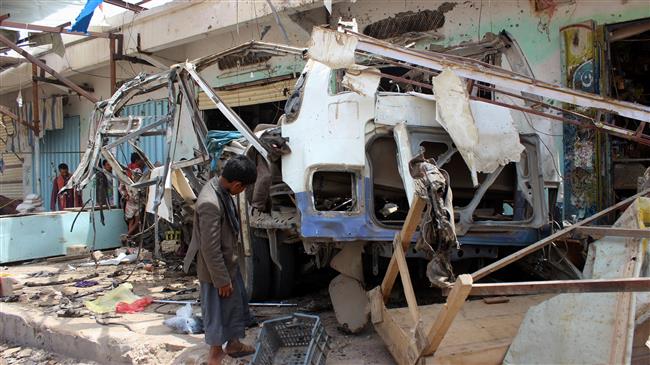
RNA - Colonel Turki al-Maliki, the spokesman for Saudi-led troops in Yemen, also denied that the vehicle hit in the airstrike was a school bus full of children, despite much evidence to the contrary.
Maliki told CNN in an interview on Sunday that intelligence information showed the bus was "not a school bus because there is no school at that time when the incident happened."
His allegations came on the same day Human Rights Watch called the macabre August 9 attack in a busy market in Yemen's northern Sa'ada an "apparent war crime."
"We never observed any kids on the bus," al-Maliki said, adding the "coalition conducted the attack against Houthi commanders and some Houthi element fighters in that bus."
The bus attacked was "a legitimate target," he added.
His remarks appeared to clash with those by Mansour al-Mansour, spokesman for the investigative Joint Incidents Assessment Team (JIAT), who earlier said a probe into the incident had found errors prior to the strike which "caused collateral damage."
"There was an obvious delay in equipping the fighter jet at the right place and at the right time, which caused missing the opportunity to target the bus -- which was a military target -- in a clear and open area, to avoid such collateral damages," Mansour said on Saturday.
The Saudi air raid hit the school bus as it drove through a market in the town of Dhahyan, killing a total of 51 people, among them 40 children, and injuring 79 others, mostly kids. The kids reportedly had been on a much-anticipated field trip marking their graduation from summer school.
According to Press TV, Maliki claimed that intelligence information showed that the bus was "not a school bus because there is no school at that time when the incident happened."
On Sunday, Human Right Watch urged an end to all weapons sales to Saudi Arabia after it was revealed that a US-made bomb was used in the attack.
The Saudi attack "on a bus full of young boys adds to its already gruesome track record of killing civilians at weddings, funerals, hospitals, and schools in Yemen," Bill Van Esveld, a senior children's rights researcher at HRW, said in a statement.
"Countries with knowledge of this record that are supplying more bombs to the Saudis will be complicit in future deadly attacks on civilians," he added.
Since the war began, there have been numerous Saudi strikes conducted "in violation of the laws of war" and without adequate follow-up investigations, HRW said.
It also said that it had identified US-made munitions at the sites of at least 24 other "unlawful coalition attacks" in Yemen, warning Washington to "immediately stop weapons sales to Saudi Arabia" or "risk being complicit in future atrocities."
847/940